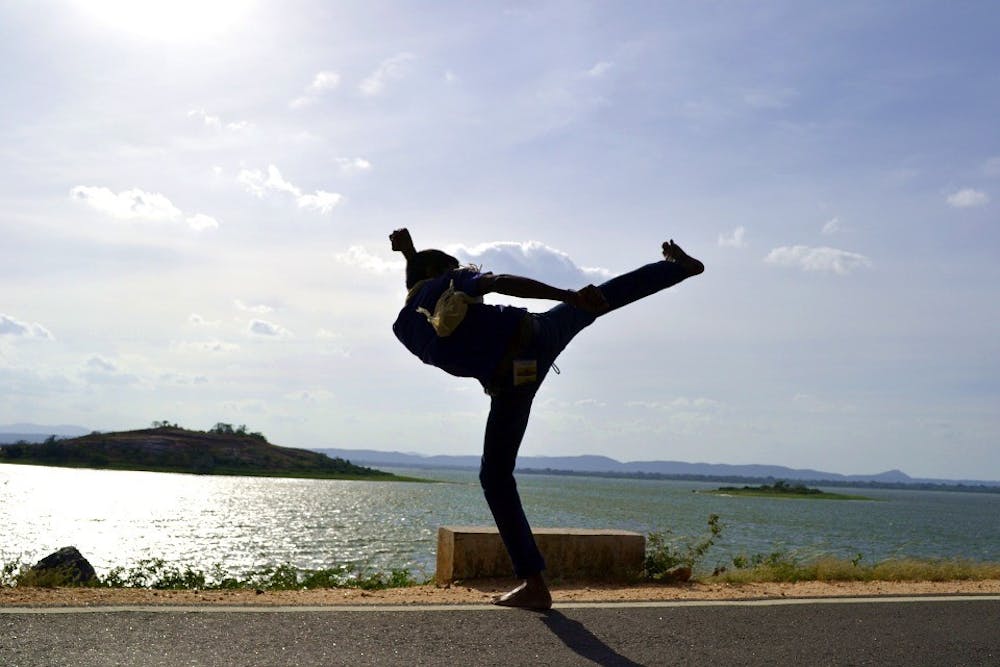Jessi Zachman, The Miami Student
As a child, Yazhou Song sat by the television, mesmerized as he watched Jackie Chan soar nimbly across the screen. Inspired by the powerful yet graceful movements of Chan and other skilled martial artists, Song has been practicing kung fu ever since.
Song, 25, a kung fu instructor at Miami University's Confucius Institute, has been studying the Chinese martial art for over 15 years. Though he is pursuing his degree in martial arts at HeBei Normal University in Shijazhuang City, China, Song currently hosts kung fu workshops, sprint classes and retreats for the Miami community.
As a part of his studies, Song is spending one year in the U.S. to gain teaching experience. This spring will mark the end of Song's year teaching on Miami's campus. He will then return to China to resume his martial arts degree program.
"It has become my hobby and become my life. I love it," said Song, who also holds a certificate for kung fu teaching, judging and performance. The certificates are a physical representation of his skill level, as only those training in higher level duans, or ranks, can obtain them.
Song trains in the sixth duan out of the nine total kung fu ranks. Reaching this proficiency level is no easy feat, as kung fu students must train for years in order to reach the next duan.
Chen Zhao, the director of the Confucius Institute, emphasized Song's high skill level. Due to the Chinese martial art's difficulty, a kung fu student cannot reach the seventh duan until he or she is 45-years-old. This is a testament to Song's skill, as he is in the highest duan possible for his age group.
"Chinese kung fu is hard. For the higher level, you need to practice for many years. Otherwise, you cannot reach such a high duan," Zhao said.
Since its establishment on Miami's campus in 2007, the Confucius Institute has worked to share Chinese culture with domestic students. Song sees his classes as a fun, interactive outlet to teach students the basic skills of kung fu.
Song begins a class by warming up the head, neck, shoulders and back to prevent injury. While warming up is not unique to kung fu, Song's method is different from a warm up found in a typical P.E. class. Students warm up according to a Chinese method, that involves running in a figure-eight pattern. Song demonstrates the criss-cross running pattern that is a paired with an occasional jumping twist movement.
"It's very funny for other students. Maybe American people don't do this movement, as every movement I teach is from China," said Song.
Classes center around learning basic movements. Kung fu stances are the foundation, such as the horse stance. One must maintain a straight posture while bending the knees in a wide stance, with the ultimate goal of getting the knees to form a line that is parallel with the floor.
Song teaches students basic stances, like hand placements, in short sequences. He often teaches the arm and leg movements separately at first and later demonstrates the finished product. This helps students retain the information more easily.
Senior Zach Berks enrolled in Song's sprint class for this semester because he was looking for something different. The kung fu style of taijiquan, more commonly known as tai chi, offers him a break from routine that is focused on movement.
"My favorite part about the class is learning how even the simplest movements can be complicated and the progress we see as a class everyday," Berk said.
While kung fu is a martial art, combat is not the end goal of learning kung fu.
Qiao Zheng, instructor at the Confucius Institute, breaks down the misconception that kung fu is an aggressive practice by explaining the peaceful nature of the martial spirits. Kung fu is physical movement that is meant to deter fighting. The aim is to resolve or end fighting as opposed to initiating aggressive combat.
"The essence of the martial spirits is no fight. The chinese character for martial arts means stop fighting, although it is fighting. The meaning of the word is stop fighting. Fighting for the aim of no fight," Zheng said.
Song exemplifies these ideals through his teaching. Song respectfully corrects his students' placement as they execute exercises across the floor. He ends his class with a demonstration of the salute, which shows respect to one's instructors, elders and parents. In his classes, Song highlights the benefits that kung fu can bring to those who practice.
"I think that kung fu can improve my physical condition, relax my stress and anxiety, and cultivate feelings and emotions," he said.

